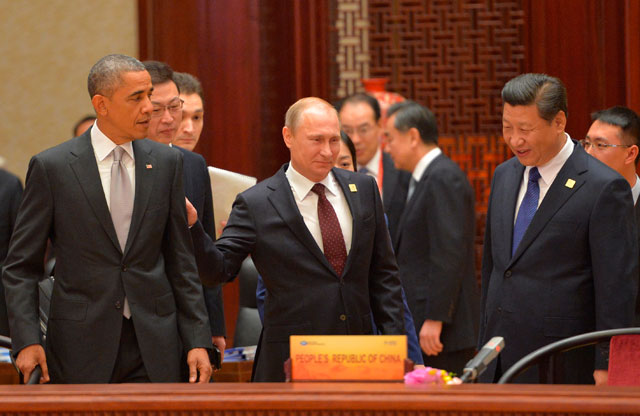BEIJING — An Asia-Pacific summit on Tuesday endorsed a Beijing-backed route towards a vast free trade area in the region, host Xi Jinping said, calling it a "historic" step.
At the same time the Asia-Pacific Economic Cooperation (APEC) meeting saw a flurry of diplomatic activity, with Russia's President Vladimir Putin — often criticised by the West — meeting his US counterpart Barack Obama and, separately, Australian Prime Minister Tony Abbott.
A day earlier Xi had met Japan's Prime Minister Shinzo Abe, in the first formal leaders' meeting for nearly three years between the Asian neighbours, who have an often difficult relationship.
China has been keen to underscore its rising trade and diplomatic clout during the summit, at a lakeside venue north of the Chinese capital, and Xi said the bloc had "approved the roadmap for APEC to promote and realise the Free Trade Area of the Asia-Pacific".
He called it a "historic" step reflecting the "confidence and commitment of APEC members to promote the integration of the regional economy", and symbolising "the official launch of the process towards the FTAAP".
The FTAAP would build on other initiatives including the smaller US-backed Trans-Pacific Partnership (TPP), but China's firm advocacy of the plan over TPP has added to Sino-US trade rivalry.
Besides accounting for more than 50 per cent of global gross domestic product, 21-member APEC also makes up nearly half of world trade and 40 per cent of the Earth's population.
Obama, Xi and Abe respectively lead the world's three biggest economies, while Russia is a powerful player in energy exports whose annexation of Crimea and support for Ukrainian rebels has sent relations with the United States into a tailspin, with the West imposing sanctions on Moscow.
But Obama held talks of about 15-20 minutes with Putin, according to the White House, with their conversations covering Iran, Syria and Ukraine.
The Russian leader also held a bilateral with Abbott, who has publicly declared his fury at the downing of Malaysia Airlines Flight MH17 over eastern Ukraine, killing 298 people including 38 Australian citizens and residents.
Abbott's office underlined that evidence suggested a Russian-supplied missile from a launcher that was then returned to Russian territory was responsible, labelling it "a very serious matter".
For its part China is embroiled in territorial and historical disputes with Japan, but Abe stressed cooperation with Beijing after the summit, calling for the neighbours to press ahead with tentative efforts to put their deep hostility behind them after he met Xi.
"Japan and China, we need each other. We are in a way inseparably bound with each other," Abe told reporters. "Japan and China both have responsibility for peace and prosperity of the region and of the world."
Pacific rivalry
Washington has been pushing the TPP, which aims for a loosening of trade restrictions and embraces 11 other Pacific Rim countries including Japan, Canada, Australia and Mexico, while notably excluding China.
Some Chinese analysts and state media have framed the TPP as an attempt to check Beijing's growing economic clout — allegations Washington dismisses.
At the meeting Obama himself praised China for focusing attention on APEC's role in eventually achieving the FTAAP, first proposed in 2006, but also reiterated the US priority was the smaller TPP.
"The many regional initiatives will contribute to the eventual realisation," he said. "We see our engagement in the Trans-Pacific Partnership as a contribution towards that effort."
Xi hosted Obama for a private dinner Tuesday at the Zhongnanhai leadership compound in Beijing, the two men walking through the grounds beforehand, and were to meet again on Wednesday.
China's increasing economic and military prominence has lead to tensions with Washington, including over rival allegations of cyber-spying.
But both sides say they want to manage their relationship to avoid clashes in the past that have occurred between rising and established powers.
In a sign that they can work together, the White House announced Tuesday that they had "reached an understanding" on an agreement to reduce tariffs on information technology trade.
Obama also announced in Beijing the two governments had reached a reciprocal agreement to extend visa validity periods to as long as a decade.
But Xi unmistakably underscored China's intention to enhance its world influence by laying out his vision of a Chinese-driven "Asia-Pacific dream" in a speech on Sunday to APEC business leaders.
Meanwhile Obama has stressed US leadership, calling his country a "thoroughly Pacific nation".
